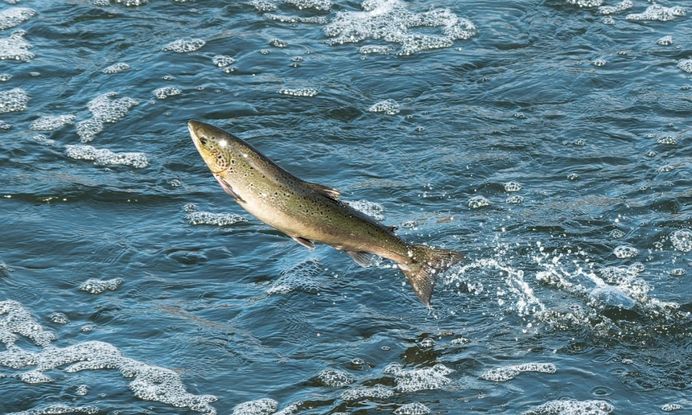The IUCN Red List of Threatened Species has reclassified the global Atlantic salmon (Salmo salar) population as near threatened in its latest species reassessment.
At the Trust, we are continuing to work hard to support Atlantic salmon stock in the region, with the culmination of the six-year Water for Growth project on the rivers Camel and Fowey this year indicating an improvement in localised salmon numbers. Two of the ways we have helped achieve this has been through the removal of 17 barriers to migration and habitat restoration over four hectares.
But on-going action is needed locally, regionally and nationally to reverse the downward spiral of a keystone species, which is a species vital to the ecosystems in which they live. Challenges to healthy populations of Atlantic salmon include climate change impact, lowered water quality, in-river barriers and pollution.
An example of on-going projects we are delivering to support migratory fish includes Strategic Exe Weirs (SEW).
Tom Watts, SEW project officer said: “The project aims to stop the declining trajectory of salmon and other migratory freshwater fish.
“By offering bespoke solutions that increase migratory passage over human-made barriers, our work is enabling free migration to spawning habitat in wider flow windows.
“This counters the effects of climate change and enhances the ecological health of our rivers.”
We consider the River Barle an important conservation area for salmon in the Exe catchment.
It usually shows more salmon fry than any other tributary to the Exe.
This year, our Fry Index Surveys didn’t record a single good site however, and some Barle sites had no juveniles.
This means our surveys only showed moderate/poor/absent sites in the River Barle. This is an alarming decline.
In our Exe catchment surveys for salmon fry in 2023 we only recorded one “Excellent” classification in the whole catchment.
Adrian Dowding, the SEW project manager, said: “This is not acceptable – we need to reverse our declining fish stocks, now.”
IUCN data
The IUCN released the latest update on global species at the COP28 UN climate conference in the United Arab Emirates.
It includes a comprehensive assessment of the world’s freshwater fish species, revealing that 25% (3,086 out of 14,898 assessed species) are at risk of extinction.
The Atlantic salmon has moved from Least Concern to Near Threatened, with new evidence showing the global population decreased by 23% between 2006 and 2020.
Local figures
Our Aquatic Services Manager Olivia Cresswell said: “For the past 15 years, we have conducted fisheries surveys across Devon and Cornwall every summer to monitor salmon and trout populations.
“This year we surveyed 320 sites and recorded an average of 3.85 salmon per site, while our 2022 records across 221 sites averaged 16.3 salmon per site.
“It’s very worrying to see such a reduction in our average numbers when even more sites have been monitored.”
More info
The IUCN (International Union for Conservation of Nature) is a membership Union of government and civil society organisations, working to advance sustainable development and create a just world that values and conserves nature.
Photo credit: Charles-Fleming

